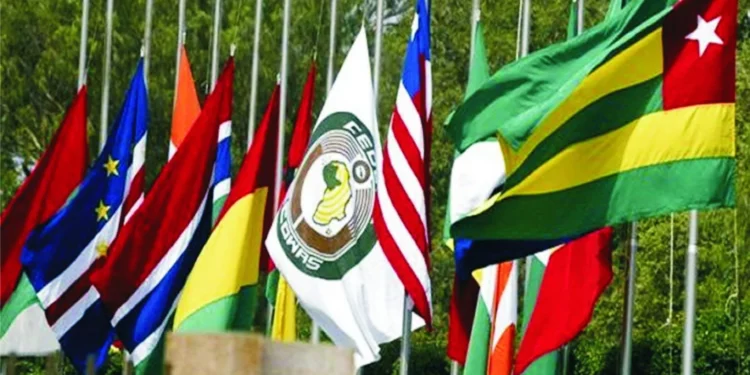2nd July 2024
The President of the Economic Community of West African States Commission, Dr Omar Tourey, said on Monday that Mali, Burkina Faso and Niger Republic would lose a lot if they do not rescind their decision to exit the regional bloc.
Tourey said the exit of the three countries would also have a negative effect on the joint forces being planned to confront terrorism and other security threats in the region.
Apart from the $500m projects, the ECOWAS Commission president said citizens of the three countries would also lose the privilege of using ECOWAS passports and would not be able to register companies.
Tourey said these on Monday at the formal opening of the first 2024 ordinary session of the 6th ECOWAS Parliament in Abuja.
The three Sahel countries had earlier in January officially communicated their decision to quit ECOWAS after they were slammed with sanctions over military take-over.
ECOWAS had lifted the sanctions on them and encouraged them to return.
Tourey, reflecting on the situation on Monday, said: “Our region is facing the risk of disintegration with Mali, Burkina Faso, and Niger notifying ECOWAS of their intention to exit.
“Their exit will worsen insecurity and free movement, and deal a deadly blow to ECOWAS, especially regarding our joint efforts towards forming a regional standing force which all member states have agreed to.
“It will also lead to international isolating of these three countries and they will also not enjoy ECOWAS support for any international position they aspire for.”
On the privileges that Mali, Burkina Faso and Benin Republic would lose if they insisted on leaving ECOWAS, Tourey said: “For instance, they will stop using ECOWAS passports, and cannot register companies.
“ECOWAS will stop all on-going projects totaling over $500m dollars in their countries.
“ECOWAS Bank for Reconstruction and Development alone has projects worth nearly $321m dollars in these countries.
“Their quitting will also lead to the closure of regional institutions in their countries, and this will lead to the loss of many jobs by their citizens.”
Tourey, therefore, urged the parliamentarians to make meaningful contributions towards integrating West African countries as one entity.
In his own remarks, the President of the ECOWAS Court of Justice, Justice Edward Asante, called on the bloc’s parliament to ensure that Mali, Burkina Faso and Niger Republic rescinded their decision to exit the regional bloc.
Asante said he was aware that the parliament had been engaged with high-level officials of those states in order to ensure their overdue return to ECOWAS, through their members.
He described the effort as a noble initiative for which the parliament should be commended and which should be sustained under the 6th legislature.
“This should continue until the realisation of the objective that informed the decision in the spirit of solidarity and complementarity, which is at the foundation of the community.
“This is so that we can continue our relentless march towards the development of our region by leveraging our rich human and material resources.
“I can assure you that the court remains available to provide whatever support that is necessary in furtherance of this and other initiatives that will preoccupy the members during the sixth legislature through its standing, joint and ad hoc committees,” Asante said.
The ECJ President noted that the session’s inauguration coincided with a period of “seismic political developments in the region, which if not appropriately managed, have grave implications for the region.”
According to him, these could potentially hamper the bloc’s efforts at democratic consolidation, regional cohesion and integration of the region.
“These relate to the resurgence of military coups in the region and avowed intention of member states that have, despite our entreaties, refused to return to the community,” he said.
Asante recalled that the court had sought to draw attention to the scourge by providing the platform of its 2023 international conference in Banjul to discuss these threats to the region’s struggle to entrench democracy in the region.
“I am hopeful that the presentation by the president of the Commission on Community Work programme during this session will enable members of parliament to have further insight into the regional efforts to reintegrate the affected states into the ECOWAS family,” he added.
Meanwhile, the Speaker of Nigeria’s House of Representatives, Tajudeen Abbas, urged ECOWAS Parliament to find solutions to the scourge of terrorism, banditry, piracy, human trafficking, human rights abuses, the impact of climate change and bad governance in the sub-region.
Represented by the Deputy Speaker of the House, Benjamin Kalu, who was earlier formally inaugurated as a member of the ECOWAS Parliament, Abbas harped on the need for commitment on the part of member states of the sub-regional body, adding that the resolution of the body would only take effect when member states demonstrated eagerness to drive change.
A statement signed by Chief Press Secretary to the Deputy Speaker, Levinus Nwabughiogu, quoted Abbas as saying, “While I feel greatly delighted to commend the ECOWAS Parliament for these invaluable contributions, we must also acknowledge that these multifaceted challenges are still confronting the sub-region in new and complex dimensions. Terrorism, banditry, piracy, human trafficking, human rights abuses, the impact of climate change and bad governance have remained serious impediments to the peace, security and economic development of our sub-region.
“These challenges have placed greater responsibility on the ECOWAS Parliament to continue to carry out its legislative functions with increased vigour, passion and commitment. It is my sincere hope that this session of the parliament will produce resolutions that will impact positively and go a long way in mitigating these challenges. However, it is important to stress that any resolutions reached will amount to nothing if there is no commitment and cooperation on the part of ECOWAS member states.”
